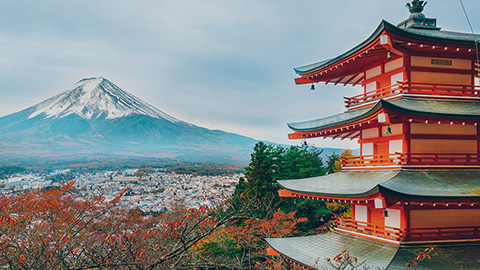Narrator: Investing in Japan Expert Perspectives
Foreign investment in Japan has continued to increase, and as of the end of 2022, totaled 46.2 trillion yen. In this interview series, we unravel the reasons behind Japan's current allure as an investment destination, exploring the insights of experts from around the world.
Interviewer: We are very honored to have Mr. Murat Aktihanoglu in our program today.
He is a managing partner at Entrepreneurs Roundtable Accelerator and Remarkable Ventures in New York city.
Particularly, he has an excellent track record in investing in startups that aim to solve climate change issues in the seed and early stages. So very great to have you, Mr. Murat.
Murat: Fukushima-san, thank you very much. Great to be here.
Interviewer: Could you tell us a little bit about yourself and about the venture capital that you co-founded?
Murat: Thank you very much. So, I'm originally from Turkey, so I have a computer science background, technology background. I lived in San Francisco around 30 years ago. I was working for a large tech firm and then I moved to New York 25 years ago. And I've been working on tech startups ever since then. And when I first moved to New York, I wanted to make New York a much better place for startups.
After being in New York for five years, I actually moved to Tokyo, and I lived in Tokyo for two years and I really, really enjoyed Japan. So, this interview is actually, it's kind of like cheating because I'm a huge Japan fan. So, my co-founder John Axelrod and I, we started the first tech accelerator in New York City in 2010, and we gathered together the community of experts, investors, entrepreneurs and corporate executives and all these like vertical experts and we launched our program, accelerator and fund in 2011. We invested in many different companies, and currently we have 315 portfolio companies that are being invested in.
And obviously this is quite a lot, we have a pre-seed fund and a follow-on fund. But in the past four years, we were very lucky to see many, many climate tech companies. So currently we are also investing from a climate fund, and I've been coming to Japan for 20 years and in the past, around 12 years, we also developed very deep relationships with Japan in terms of business.
Interviewer: Okay, great. So, thank you for the overview. So just going back a little, you talked about your venture capital, and you said that there are a lot more climate tech startups that you are supporting. What is the global environment of climate tech startups going out into business a lot?
Murat: Currently we are all seeing the news and experiencing like floods and wildfires and droughts or like hot weather and really, really different climates. So, people have anxiety and they’re really looking for solutions to fix this problem.
So, corporations at the same time, they are really, really paying attention because if they don't look like they are fighting climate change, then the mainstream customers will be against them.
So, there are many, many factors that came together in the past two or three years even, that is making startups that are providing climate solutions very, very easy to invest. Every week we'll probably be investing in climate in the next 2 to 3 years.
Interviewer: Wow. Wow. So now going into the Japanese market, you mentioned a bit about the attractiveness of the Japanese market, but can you elaborate more? What are some of the reasons that startups should come to Japan to expand their businesses?
Murat: Absolutely. So, from the U.S., startups go two directions. One, Asia and one Europe,and in Europe they land somewhere.
Entering the Japanese market is the easiest thing to do when you're going to Asia, because the constitution is very similar to the U.S. Constitution or the European Constitution. So, you will not have to adjust to different rules or different regulations, and you are not in danger of losing your IP.
So, Japan is almost like the most friendly environment in Asia for U.S. companies. Plus, Japanese government recently is really, really focusing on bringing more global companies into Japan. The entrepreneur visa is a huge advancement. And there are many new privileges and grants and different programs from the Japanese government, from Tokyo government. At the same time, there are many advantages from JETRO, and other local governments. They give you a free space and you can get support about many different expenses you might have.
And they also guide you and connect you with other large corporations in Japan. So, it's almost like Japanese protected environments where the U.S. startup can move to do business the way they are doing business in the U.S. without any concerns. Obviously, the Japan's infrastructure is better than the U.S. infrastructure. Everything works. Transportation, telecommunications. Everything's cheaper.
And if I may mention, Tokyo Metropolitan Government has a new project called Tokyo Innovation Base. It's a building near Yurakucho-station, which is like one stop from Tokyo station. So, Tokyo Metropolitan Government is also providing free office space, free resources as well as JETRO, JETRO's Invest Japan and other programs. So, there are many different programs in Japan to really focus on global companies coming to the Japanese market.
Interviewer: And tell me a bit more about the Japanese business culture from your perspective, living in Japan and going back and forth. You just mentioned that a lot of the consumers are, I guess, tech savvy, but what else can you tell us about the business culture here?
Murat: Obviously, that's one of my favorite parts of Japan, that Japanese business culture is actually very, very straightforward, very friendly and very easy to operate culture. You can trust people in general, obviously. But Japanese culture is such that, you know, crime is very low.
Interviewer: It's true. Even in Tokyo, it's such a big city, you know, it's comparable to New York or London and it's still safe and cheap and very efficient, right?
Murat: Absolutely.
Interviewer: What about the Japanese market for climate tech startups?
Murat: So, I think Japanese government is going to provide some benefits, tax benefits, some other benefits for climate services. So, at the moment, we are watching to see what the Japanese government will do to provide better like to reduce the green premium for carbon reducing services. But right now, we have some companies that provide employees to decarbonize their homes, or they measure the carbon storage in natural assets.
All these companies are finding Japanese customers and also, we are connecting with many Japanese corporations that really want to access like climate innovation and they want to bring those companies to Japan. And Sumitomo Mitsui Banking Corporation, SMBC is an anchor investor for our climate funds and they are really working with us to bring climate innovation to Japanese corporations and into Japanese mainstream markets.
So, there's a lot of interest and we are also working with Ibaraki Prefecture where are Tsukuba Science City and, Keihanna Science City and they have a lot of deep tech companies. Like insulation materials or different kind of Japanese startups with climate technologies and we are also expanding to the global market as well. Japanese corporate VCs are very, very interested in investing in our climate innovation.
We are working with multiple Japanese corporations on this, and they really are looking around the world for the best climate technologies to bring to Japan. At the same time, obviously Japan is very advanced in hydrogen technologies. So, Japan has some technologies that it's also exporting. We are seeing a lot of activity from we are working with the governments from Kawasaki, Kobe, Tokyo, Osaka, Fukuoka.
So, Japan is very very active, recently also with the governments paying more attention we are seeing much more focus on interests from Japan in climate technologies as well.
Interviewer: Now can you tell us a bit more on some of the examples of your venture capital partnering with Japanese companies? You mentioned Sumitomo Mitsui Banking Corporation.
Murat: So, we've been working with SMBC for the past eight years. They've been investing in our funds, and we collaborate with them on an ongoing basis. These days we are working with SMBC's sustainability solutions departments to bring climate innovation technologies to Japan's corporations, and to Japan's market. So, what we are doing is we work with many partners in the U.S., many, many climate startups, also many non-profits like Environmental Defense Fund, Rocky Mountain Institute and Activate Fellowship.
SMBC is an anchor in the climate funds, and we told them we are building a new climate fund to invest in the latest climate technologies. They really increased their partnership. They trusted us and thanks to them, we are building this climate fund, which is going to invest in amazing climate companies around the world and take their technologies to the next level.
So, as well as like connecting these companies to Japan's customers, we are very lucky to partner with SMBC and other Japanese corporations on this matter. We are kind of bringing the U.S. network, U.S. community and U.S. innovation and combining them with Japan's capital and Japan's customer base they have. So, it's a win-win situation.
Interviewer: And what are your plans going forward about the Japanese startup market?
Murat: We are very bullish on the Japanese opportunity. Our climate fund is actively looking at climate companies that we can invest in Japan. But at the same time, we see our climate startups we invest in the US to expand to the Japanese market, obviously. I see a huge opportunity for our companies because we are so tightly integrated with large Japanese corporations that we are going to be able to bring our U.S. companies into the Japanese market and expand their revenue and partnerships and customers.
So, investing in Japan as well as like bringing our U.S. companies into the Japanese market.
Interviewer: So, to wrap it up. Can you tell us in a nutshell, what is the value and advantages of entering the Japanese market? Specifically for startups and for venture capitals?
Murat: For startups, there's no question that Japan is the best market to enter Asia from. Japan is around three hours from Korea, Taiwan and China and all the large markets. It's a very trusted place to set up your Asian office. You will not have any issues. You will be supported by the Japanese government. There are many different programs in Japan to really focused on global companies coming to the Japanese market.
And from the investors point of view, again, Japanese government and JETRO and Tokyo government has many, many programs to encourage global investors to come to Japan There are many advantages and there are also sometimes matching funds for VCs that are raising money, that are raising funds in Japan. The only thing missing is, I think many U.S. and European investors, they are not familiar with the Japanese markets and that's why they are staying outside. But as they learn more about the Japanese market, I think they will be coming to market as well. So, I would highly recommend all investors to come to Japan and really see for themselves how great it is.
Interviewer: Well, thank you very much for your insightful comments. We really enjoyed the discussion.
Murat: Thank you very much Fukushima-san. Thank you.
Narrator: Undoubtedly, Japan stands out as the premier entry point to the Asian market. Coupled with robust government backing, the current environment presents a favorable opportunity for startups to venture into Japan.
Stay tuned to the "Expert Perspectives" series for invaluable insights from global experts.
Investing in Japan Expert Perspectives


































